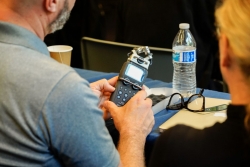Tag: education
Sign up for the Oral History Center’s Advanced Institute (August 5–9)
The UC Berkeley Oral History Center is pleased to announce that applications are open for the 2024 Advanced Institute!
The OHC is offering online versions of our educational programs again this year.
Advanced Institute: M–F, August 5–9, 8:30 a.m.–2 p.m., via Zoom
We are now accepting applications for our 2024 Advanced Institute on a rolling basis. Please apply early, as spots fill quickly.
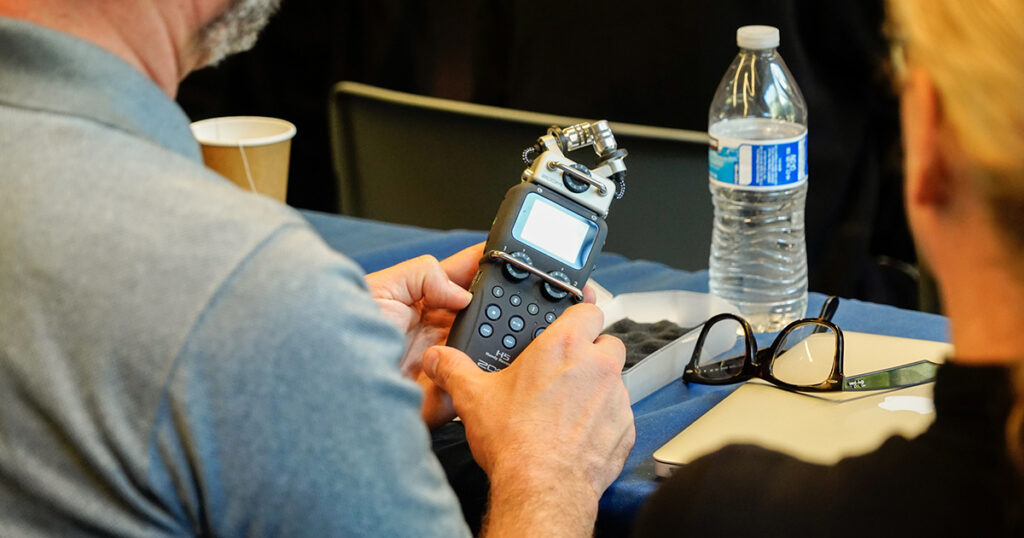
The Oral History Center is offering a virtual version of our one-week Advanced Institute on the methodology, theory, and practice of oral history. This will take place Aug. 5-9, 2024.
The institute is designed for graduate students, postdoctoral fellows, university faculty, independent scholars, and museum and community-based historians who are engaged in oral history work. The goal of the institute is to strengthen the ability of its participants to conduct research-focused interviews and to consider special characteristics of interviews as historical evidence in a rigorous academic environment.
We ask that applicants have a project in mind that they would like to workshop during the week. All participants are required to attend small daily breakout groups in which they will workshop projects.
In the sessions, we will devote particular attention to how oral history interviews can broaden and deepen historical interpretation situated within contemporary discussions of history, subjectivity, memory, and memoir.
Apply for the Advanced Institute.
Overview of the week
The institute is structured around the life cycle of an interview. Each day will focus on a component of the interview, including foundational aspects of oral history, project conceptualization, the interview itself, analytic and interpretive strategies, and research presentation and dissemination.
Instruction will take place online tentatively from 8:30 a.m. to 2 p.m. Pacific time, with breaks woven in. There will be three sessions a day: two seminar sessions and a workshop. Seminars will cover oral history theory, legal and ethical issues, project planning, oral history and the audience, anatomy of an interview, editing, fundraising, and analysis and presentation. During workshops, participants will work throughout the week in small groups, led by faculty, to develop and refine their projects.
Participants will be provided with a resource packet that includes a reader, contact information, and supplemental resources. These resources will be made available electronically prior to the institute, along with the schedule.
Applications and cost
The cost of the institute is $600. We are offering a limited number of participants a discounted tuition of $300 for students, independent scholars, or those experiencing financial hardship. If you would like to apply for discounted tuition, please indicate this on your application form and we will send you more information.
Please note that the OHC is a soft-money research office of the university, and as such receives precious little state funding. Therefore, it is necessary that this educational initiative be a self-funding program. Unfortunately, we are unable to provide financial assistance to participants other than our limited number of scholarships. We encourage you to check in with your home institutions about financial assistance; in the past we have found that many programs have budgets to help underwrite some of the costs associated with attendance. We will provide receipts and certificates of completion as required for reimbursement.
Applications are accepted on a rolling basis. We encourage you to apply early, as spots fill up quickly.
Questions
Please contact Shanna Farrell (sfarrell@library.berkeley.edu) with any questions.
About the Oral History Center
UC Berkeley’s Oral History Center, or the OHC, is one of the oldest oral history programs in the world. We produce carefully researched, recorded, and transcribed oral histories and interpretive materials for the widest possible use. Since 1953 we have been preserving voices of people from all walks of life, with varying perspectives, experiences, pursuits, and backgrounds. We are committed to open access and our oral histories and interpretive materials are available online at no cost to scholars and the public.
Sign up for our monthly newsletter featuring think pieces, new releases, podcasts, Q&As, and everything oral history. Access the most recent articles from our home page or go straight to our blog home.
Announcing Dates for 2021 OHC Educational Programs
The Oral History Center is pleased to announce that applications are now open for the 2021 Introductory Workshop and Advanced Institute!
The Introductory Workshop will held over two days on March 5-6, 2021.
The 2021 Introduction to Oral History Workshop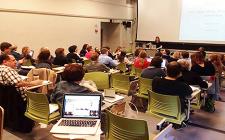 will be held virtually via Zoom over two days on Friday, March 5, from 12–3 p.m. and Saturday, March, 6 from 9 a.m.–1.p.m. Pacific Time. Applications for this workshop are open here and will be accepted through February 16, 2021. Space is limited so apply early to ensure a spot.
will be held virtually via Zoom over two days on Friday, March 5, from 12–3 p.m. and Saturday, March, 6 from 9 a.m.–1.p.m. Pacific Time. Applications for this workshop are open here and will be accepted through February 16, 2021. Space is limited so apply early to ensure a spot.
The two-day day introductory workshop tuition is $200 and is designed for people who are interested in an introduction to the basic practice of oral history. The workshop serves as a companion to our more in-depth Advanced Oral History Summer Institute held in August.
This workshop focuses on the “nuts-and-bolts” of oral history, including methodology and ethics, practice, and recording. It will be taught by our seasoned oral historians and include hands-on practice exercises. Everyone is welcome to attend the workshop. Prior attendees have included community-based historians, teachers, genealogists, public historians, and students in college or graduate school.
The Advanced Institute will be held from August 9-13, 2021.
The OHC is offering an online version of our one-week advanced institute on the methodology, theory, and practice of oral history. This will take place via Zoom from August 9-13, 2021. Applications will be accepted through July 16, 2021. Apply now!
The cost of the Advanced Institute has been adjusted to reflect the online nature of this year’s program. This year’s cost has been adjusted to $550. See below for details about this year’s institute.
The institute is designed for graduate students, postdoctoral fellows, university faculty, independent scholars, and museum and community-based historians who are engaged in oral history work. The goal of the institute is to strengthen the ability of its participants to conduct research-focused interviews and to consider special characteristics of interviews as historical evidence in a rigorous academic environment.
We will devote particular attention to how oral history interviews can broaden and deepen historical interpretation situated within contemporary discussions of history, subjectivity, memory, and memoir.
Overview of the Week
The institute is structured around the life cycle of an interview. Each day will focus on a component of the interview, including foundational aspects of oral history, project conceptualization, the interview itself, analytic and interpretive strategies, and research presentation and dissemination.
Instruction will take place online from 8:30 a.m. – 12:30 p.m. Pacific Time, with breaks woven in. There will be three sessions a day: two seminar sessions and a workshop. Seminars will cover oral history theory, legal and ethical issues, project planning, oral history and the audience, anatomy of an interview, editing, fundraising, and analysis and presentation. During workshops, participants will work throughout the week in small groups, led by faculty, to develop and refine their projects.
Participants will be provided with a resource packet that includes a reader, contact information, and supplemental resources. These resources will be made available electronically prior to the Institute, along with the schedule.
Applications and Cost
The cost of the institute is $550. OHC is a soft money research office of the university, and as such receives precious little state funding. Therefore, it is necessary that this educational initiative be a self-funding program. Unfortunately, we are unable to provide financial assistance to participants. We encourage you to check in with your home institutions about financial assistance; in the past we have found that many programs have budgets to help underwrite some of the costs associated with attendance. We will provide receipts and certificates of completion as required for reimbursement.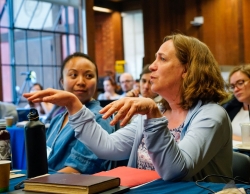
Read Amanda Tewes’s recap of the 2020 session here.
Read Q&A with Institute Alums Julia Thomas, Alex Vassar, Alec O’Halloran, Kelly Navies, Meagan Gough, Nicole Ranganath, and Marc Robinson.
Questions?
Please contact Shanna Farrell at sfarrell@library.berkeley.edu with any questions.
2020 Advanced Summer Institute Recap
In early August 2020, OHC staff gathered once more for a weeklong event: our annual Advanced Summer Institute, where we teach the methodology, theory, and practice of oral history to other practitioners. In 2020, however, COVID-19 upended our best intentions for an in-person event, and the OHC made the bold decision to turn this weeklong seminar – from lectures to small group discussions to interview exercises – into an all-digital experience. Certainly this was a sharp left turn for our office and required retooling. Nonetheless, we had a record number of applicants and 50 participants from around the world, which proves that the demand for oral history education remains strong even during a global pandemic. Despite changes for this year’s Advanced Summer Institute, I am now better able to appreciate what remains constant about the practice of oral history.
One way in which this all-digital format changed the Advanced Summer Institute was in increasing its international draw. In previous years, we have welcomed a smattering of participants from around the world. Admittedly, however, the additional cost for traveling internationally to Berkeley is something that has kept these numbers relatively low. In 2020, our all-digital format not only eliminated the cost of this travel, it also created a space for participants from several continents and timezones to join us for stimulating discussions – even in the wee hours of the morning – and share a variety of perspectives about interviewing across different cultures. Especially during a time when we are socially distancing from even our closest friends and neighbors, it was a joy to see people from around the world gather together in this way.
What did not change in our 2020 Advanced Summer Institute was the OHC’s emphasis on teaching oral history best practice through both practical experience and shared knowledge. Indeed, we doubled down on connecting participants to one another through an expanded interview exercise, wherein paired individuals planned a pre-interview and then engaged in 30-minute oral histories. They then switched roles so both could experience conducting an oral history and participating in one. From initial feedback, participants found this a valuable activity because it taught them how to ask better questions and to empathize with narrators. We also made sure to continue our small group discussions in the digital format so that participants could present their individual projects and ask for feedback in a smaller setting. This, too, proved important to sustain.
Despite these many successes, it is still important to acknowledge what we lost in this new digital format for the 2020 Advanced Summer Institute: the conversations in between sessions or during lunch that lead to meaningful connections, hands-on help with recording equipment, a distraction-free week of learning, and a sense of place near our offices at UC Berkeley. And yet, participating in this seminar – and indeed working as oral historians in the era of COVID-19 – seems to have encouraged all of us to examine the role of storytelling and documentation in this challenging moment. The resounding chorus I heard at the Advanced Summer Institute was that now more than ever we need oral history to help humanize the past and record the present. Personally, this experience reinforced my desire to connect with people – even over long distances – especially the narrators I interview in my own oral history practice.
Lucy Sprague Mitchell: Child Education Reformer and Berkeley’s First Dean of Women
By Deborah Qu
“It was naive, but it wasn’t as naive as it sounds.” — Lucy Sprague Mitchell on chasing her dream to expand career prospects for women
One hundred and fifty years ago in 1870, the UC Regents first declared that the university’s doors were open to women students, giving them the opportunity to pursue a higher education. Access to student facilities, housing, and resources were still far from equal for women. Thus began an era where thousands of young women pioneered for positive change, making their mark on the university, as well as transforming society at large. One of these women was Lucy Sprague Mitchell, the first dean of women from 1906–1912, and one of the first women instructors in UC Berkeley’s Department of English. Mitchell, an advocate for educational reform, had observed that “public opinion reacts very slowly. And there’s always been something that irritates me, and that is the voices against are so much louder than the voices for.” Yet her unrelenting optimism and her passion for education allowed her to introduce a more holistic framework for child learning and expand career prospects for women outside the limited field of teaching.

Born in 1878, Lucy Sprague Mitchell grew up in a traditional household where any sort of play was seen as “a waste of time.” In a 1962 interview with the Oral History Center of The Bancroft Library, Mitchell recalls a multitude of happy childhood memories, but they were also mixed with conflicting feelings of unworthiness and loneliness caused by her family’s strict Puritan modes of discipline. It is possible that these childhood learning experiences were great influencers in her later experimental work in education. In her autobiography, Two Lives: The Story of Wesley Clair Mitchell and Myself, she explained how she believed that the entire learning process is not complete without the “intake” of experience transforming into an “outgo,” or some living, creative action caused from the development. Perhaps these mixed childhood memories had also inspired her to take positive action through childhood education reform.
After graduating from Radcliffe College, Lucy Sprague Mitchell was appointed as Berkeley’s first dean of women at only age 23. In her oral history, Mitchell recalled a conversation she had with the university President Benjamin Ide Wheeler. His instructions were “to find out what needs to be done and to do it.” While terrified and confused, this is exactly what Mitchell did. As dean of women, Mitchell did not succumb to the “motherly” role to students that was expected of her in the early 1900s. Instead her youthful perspective allowed her to expand beyond the traditional housing and counseling needs to truly connect with students at Cal. She initiated community trips, poetry readings, and sex education discussions. She organized Parthenia, which she fondly called greek for “women of the Parthenon,” a performative showcase about various historical women and imagined female characters.
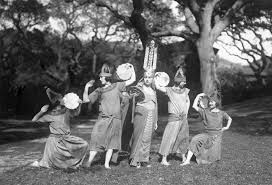
In her oral history, Mitchell reflected on why she wanted to leave her role as dean of women; Mitchell explained that her interests truly were rooted in education, not administration. During her years working with women students, she had become, she says, “extremely concerned about the lack of professional training for women excepting in the field of teaching. She explained how “not everybody is equipped to be a teacher, nor wants to be a teacher.” At the time, Mitchell found it jarring that over 90 percent of the women students she surveyed had planned to become a teacher after graduation. While Cal was progressive for its time, teaching was the most socially acceptable profession and “the only thing that the University offered to women.” In retrospect, Lucy Sprague Mitchell believed that her real reason for requesting a leave from Berkeley “was to try to explore different fields of work that women could enter and for which the University could train them.”
This disaffection inspired innovation. Lucy Sprague Mitchell brought the issue of limited education for women to six social organizations in New York, completing statistical fieldwork from women working in nursing, to labor legislation about city tenements, to public schools. Her exposure to public school education had such a profound effect on Mitchell that she became an educator resource for teachers throughout 1922–1955. She began developing experimental methods about childhood education and classroom procedure that promoted creative expression and holistically fulfilled a child’s emotional, physical, and mental needs. Her emphasis on “relationship teaching” and “active learning” over memorization helped shape the way for “social studies,” a course widely studied in American classrooms today. Her focus on the learning environment was unorthodox at the time, and it led her to new paradigms of using childhood maturity instead of age to measure emotional intellectual development. She founded Bank Street College of Education in New York as a graduate student teacher training institution in 1916 based on this same philosophy.
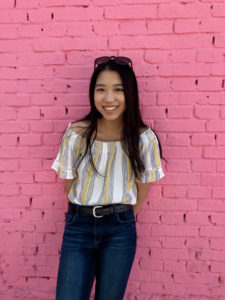
From my perspective as an undergraduate student at Cal, Lucy Sprague Mitchell’s life story teaches me that to truly orchestrate change, we should not just be focusing on the various problems of the present, but rather dreaming about all the future potential. The oral history interview allowed Lucy Sprague Mitchell to recount the early dream she had formed working with Cal students in her late 20s: to provide opportunities for young women to pursue rich and nuanced fields of study. This dream certainly did not go to waste. As a young college woman with a wide selection of majors to choose from, I am grateful that she and many others helped pave the way. Reflecting on this vision for women, Lucy Sprague Mitchell said, “Now that sounds very naive. It was naive, but it wasn’t as naive as it sounds.”
Deborah Qu is a first year undergraduate student who intends to study psychology. As a part of the celebration of 150 years of women at Berkeley, Deborah is researching the Oral History Center’s vast archive to identify women in the collection with a relationship to UC Berkeley.
Find this and all our oral histories from the search feature on our home page. You can search by name, key word, and several other criteria.
Primary Sources: British Poor Schools in the Nineteenth Century, 1812-1901
Recently added to our collection of British Online Archives are the reports of British Poor Schools in the Nineteenth Century, 1812-1901. The compiled reports were printed and then microfilmed — this resource is a digitized version of the microfilm.
These reports cover the history of poor schools and the societies that ran them in Britain, including schools from the Anglican and Wesleyan denominations as well as secular and Catholic schools, and chart the rise of education for the poor from the industrial revolution to the Victorian era.
New Oxford Bibliographies Online
The Library has added three new Oxford Bibliographies to its online holdings: Military History, Education, and Chinese Studies.
You can access them using these direct URLS:
